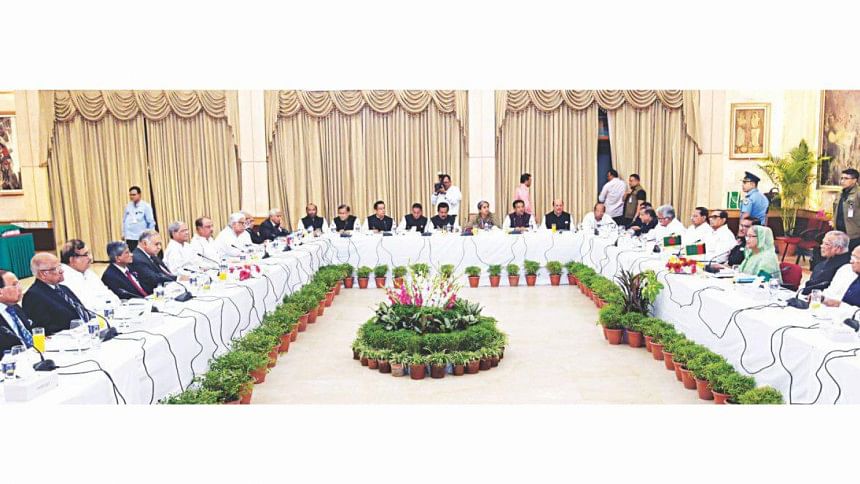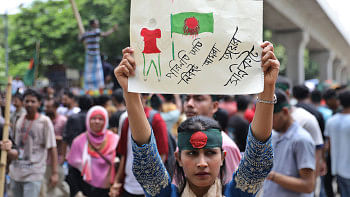Trivialisation of the dialogue is not the way to go

As the much discussed "dialogue" between the prime minister and the 14-party alliance members on the one side and the opposition parties is proceeding, many are pondering whether the political situation has changed. The question as to whether the uncertainty and anxiety surrounding the election has been reduced is still very much in the mind of Bangladeshis and observers of Bangladeshi politics. The claim that the tense situation has eased has merit, but unless signs of concrete change in the political environment is palpable, the situation may quickly descend to a confrontational mode. Dialogue is neither a zero-sum game nor can there be a victor and a vanquished, at least in one meeting; but unless a middle ground is reached, and both parties can claim to have achieved something it will be considered a futile exercise and a tactic for buying time by the government.
The dialogue, which began as a response to a letter of Dr Kamal Hossain, the leader of the newly founded Jatiya Oikyofront, to Prime Minister Sheikh Hasina, by now has involved quite a few alliances and parties. This reflects a 180 degree turn of the ruling party on the question of having any dialogue with the opposition. The PM deserves appreciation for a prompt and decisive move. As of now, even her detractors acknowledge that it was quite an astute strategic move, both in terms of the speed of her response and the timing. As the saying goes, one day is a long time in politics, we are already days away from that dramatic moment; thus, the initial sense of relief is way behind us. It is time to explore whether a new path has been paved to move forward.
What prompted the PM to shift her position—A desire to address the concerns of the opposition? Find an opportunity to be flexible without being perceived to be forced into it? To provide an impression to her detractors and the international community that the government has negotiated with everyone to make the forthcoming election inclusive? To stop the momentum of the Oikyofront? Demonstrate that the opposition are too divided? Create a fissure among the possible broad platform of opposition? We may not know for sure the answers to these questions, but the actions in the coming days will provide some clues.
It was not surprising that Jatiya Oikyafront's letter was followed by many other alliances, including the Jukta Front led by former President Badrudozza Chowdhury. The ruling party's eagerness to bring as many parties to the table as possible can be viewed as a desire to not leave anyone behind. It is indeed good to have many voices included in the discussion on important issues such as the election. However, it has also added some strangeness to the entire process. For example, at the time of writing this article, a "dialogue" was scheduled with the JP led by the Prime Minister's Special Envoy HM Ershad which has three members in the cabinet. Prior to the dialogue, Ershad made it clear that he has no demand to place but wants to discuss seat sharing with the PM: "We will just ask the Prime Minister for the number of seats that Jatiya Party would be provided in the general election." As if this was not ironic enough, the meeting of the 14-party alliance with the PM held on Sunday has been reported in the press as part of the ongoing "dialogue".
There has been widespread scepticism about the efficacy of the dialogue, because no dialogue in the history of Bangladesh, whether initiated by the parties or prodded by foreigners, ever succeeded. Yet there were many, including me, who expressed cautious optimism hoping that history will not be destiny. The attendance of the PM as the leader of the government side was unprecedented and provided the opportunity for decisions to be made instantaneously, if willing. Unfortunately, but for understandable reasons, the scepticism has not diminished even after the first round of talks with the Front. Both the government and the Front leaders have remained steadfast on their positions. But anyone familiar with any negotiations understand that the Front leaders do not expect all their demands to be met by the government—they seem to be prepared to find a middle ground. The government, on the other hand, is yet to indicate its willingness to make compromises. The PM has repeatedly asked to have trust on her about free and fair elections, but if such assurance was enough, a dialogue wouldn't have been necessary. It is the trust deficit that has caused the situation. The PM's assurance that the opposition will not be hindered in holding public meetings is portrayed by some as a concession, but shouldn't it be considered a reaffirmation of fundamental rights enshrined in the Constitution? Besides, is allowing the Front or other alliances/parties to hold public meetings enough indication of an environment conducive to freedom of expression as delineated in the Constitution and a requirement for a free, fair election? As for the PM's effort to divert other demands to constitutional bodies such as courts on the issue of Khaleda Zia's trial or deferment of the announcement of election schedule to the Election Commission are nothing different from her previous positions. Despite assurances from the PM to the contrary, the so-called "ghost cases" are being filed, and at least 184 opposition activists were arrested on the day of the dialogue.
These concerns notwithstanding, some are wondering whether the entire dialogue episode is now being turned into a media spectacle. As soon as a specific date was set for the dialogue with the Jatiya Oikyafront, there seems to be a deliberate push to make it a media spectacle, thanks to the food-obsessed journalists of various pro-government television channels, newspapers and web portals. For them, the food menu of the meeting was more enticing than the potential agenda of the discussion with larger implications. Social media was inundated with the "news" of the delicacies served and the catering services, which would have made one drool unless one could understand the reason why the country suddenly became a connoisseur of food and health-conscious. Perhaps this was because clickbait journalism has a penchant for salaciousness, and in its absence, it settled for deliciousness. This, of course, tells us about the state of journalism as does the lack of the balanced coverage of the contents of the deliberations of both parties. But these also reflect an effort to trivialise the dialogue altogether.
Despite such not-so-encouraging developments to date, there will be a second meeting between the Front leaders and the government on Wednesday at the request of the Front. It is expected that the Front will unveil its proposal for the election-time government. The Oikyofront has also requested the Election Commission to defer the announcement of the polls schedule. It is imperative that the EC allows the current efforts to continue in a positive direction. This will demonstrate whether there are chances of paving the way forward.
Ali Riaz is a distinguished professor of political science at the Illinois State University, USA.





Comments